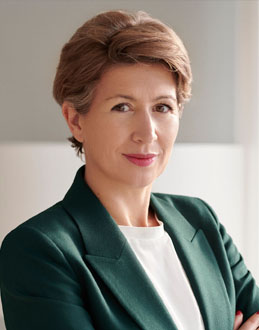Rosa Sangiorgio is Head of ESG at Pictet Wealth Management. An Italian, she travels between Geneva, Zurich and many European countries to raise awareness of a sustainable investment policy, which she considers to be long-term.
What does your mission consist of?
I look after the entire value chain of responsible investment: from data analysis to the construction of investment solutions. I also work on raising awareness of responsible investment internally, with our clients, but also with the industry. I am a member of the Swiss Banking Association's Commission for Sustainable Finance. I have brought together my two passions: finance (I was a portfolio manager until 2011) and the desire to help create a better future for everyone.
How does Pictet Wealth Management view the positive impact of investments?
As an independent company with over 200 years of experience, a long-term view is a hallmark of Pictet.
Investing in companies working on environmental and health issues is one way in which investors can contribute to society and the protection of the planet through their portfolio. Pictet has a particularly strong track record in thematic investments, listed companies and private equity. As one of the first institutions to work on private equity for private clients, we have a positive influence on the companies in which we invest directly. To this end, we establish responsible partnerships with our clients and the companies in which we invest.
Active ownership is also very important to us. We believe that positive impact is already being made by new companies, but it will also be reinforced by older companies, which will evolve and change the way they operate. We are committed to supporting them.
The three pillars of our responsible investment vision are therefore our long-term investment vision, our investment policy, and finally the strength of our commitment and voting policy.
What do you think of the multiplicity of "green finance" labels?
For our part, we work on source data linked to companies, and we analyse them: this is long and expensive, but more relevant than working on rankings, and we have the means to integrate this complexity.
Labels are tools for simplifying complex situations: they try to synthesise a set of points related to sustainability. I appreciate the effort to standardise, but the multiplicity of labels, and the differences between them, is sometimes more destructive than constructive. Doubt is growing... Customers are wary of greenwashing...
Is it possible to avoid this mistrust?
Yes, and I come back to our long-term vision. Let's take the example of energy companies, whether they are oil or gas companies.
They are not all equal. Some of these companies have started to make the shift to other, much greener types of energy: they are investing in research, they are bringing in climate change experts, they are reducing their carbon footprint significantly. Excluding them all from our portfolios is not necessarily the ideal solution. We need to support them, to integrate their expertise in the distribution of energy, for a rapid transition to a more resilient and sustainable economy.
Is impact finance mainly appreciated by your young clients?
Young clients are very aware, but today clients of all generations are interested in sustainable finance.
Some think in terms of environmental responsibility only. Others are passionate about innovation, and are turning to new companies that offer solutions that can be applied very quickly in a critical context, such as the global water crisis.
Others realise that regulations are being tightened, and that polluting companies will have to invest, finance experts, and set up procedures, which will inevitably have an impact on their performance... not to mention the reputational cost, and the bad reputation of the employer brand.
A final word?
There are many actors of change: shareholders, investors, governments.
Today, the dialogue is difficult between climate activists and lost business leaders. We need a constructive approach. The work of the Albert II Foundation, which builds bridges between finance and philanthropy, is an excellent example of what should be done...






